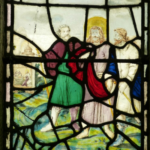Creating And Enforcing A Boundary Does Not Make You A Donkey

“The Lord God took the man and put him in the Garden of Eden to work it and take care of it. And the Lord God commanded the man, “You are free to eat from any tree in the garden; but you must not eat from the tree of the knowledge of good and evil, for when you eat from it you will certainly die.” (Genesis 2:15-17 NIV).
All was well with God’s creation on earth for the entirety of the first two chapters of Genesis. Then, the story turns as we failed to obey His instructions, and the rest of the Bible is His loving actions to bring us back into relationship with Him. The fall and exit from the Garden of Eden was due to our failure as humans to honor His rules. Another word for rules is boundaries. God established a boundary regarding the tree of the knowledge of good and evil. Once that boundary was broken, Adam and Eve were no longer welcome in the Garden and we all today deal with those consequences in the form of pain, physical death, and toiling for food.
Speaking of boundaries, I recently read a good book on the subject by Lysa TerKejurst entitled, “Good Boundaries and Goodbyes: Lovoing Others WIthout Losing the Best of Who You Are.”
You my know her from her appearances on K-LOVE radio and her Proverbs 31 ministry. In the book she talk about the pain she experienced when her hsuband had violated the sanctity of their marriage and she subseuqnetly instilled boundaries. When the boundaries were broken, she enforced them and filed for divorce.
She now must deal with the snipers in her life that have launched a whisper campaign against her. How could a Proverbs 31 woman divorce her husband. God hates divorce so why would she do this? Why not show love instead of drawing up boundaries. Why is she trying to control him with these boundaries?
I think it is important to understand that our God is a God of boundaries. He has established boundaries on us and very likely understands the need for us to establish boundaries on others if we are to love ourselves as we love Him. We can, and should, still love those in our life with whom we have placed boundaries, but now we do so in a different manner. One that is healthy for all parties and respects and honors God.
Some of us do not honor the speed limit, and the consequence of failing to obey that boundary is a speeding ticket. It is natural to try to blame “the system” for the ticket but the real fact is we were speeding, we failed to honor the boundary, and we will suffer the consequences. In rural areas, a no trespassing sign is fairly common. The landowner is not a donkey because he wants to keep people off of his land. The property line is the boundary. Your trespassing, and disregard of boundaries, is done at your peril.
If a person has established a boundary in their life it is probably not because they have a desire to control somebody else. More likely, they do have a very strong desire to enforce a boundary around the things that they hold dear, which is likely their family, their self, their ministry, and their work. The boundary was likely instilled because somebody in word or action became a threat. Lysa wrote in her book, “Remember all the work you’ve done to draw boundaries was not about controlling someone else’s behavior. It’s about paying attention and being honest about how someone’s poor behavior and lack of responsibility is possibly controlling you. And when people close to us are acting out of control, that’s when we run the greater risk of lacking self-control. When a relationship shifts from being difficult to being destructive, it’s the right time to consider a goodbye.”
So, if we feel compelled to label the boundary setter “a donkey, unchristian, mean, controlling, psycho, etc.” because they have established a boundary and we are unwilling and/or unable to respect that boundary, then perhaps it is time for us to entertain the possibility that the true “donkey” is the one looking at us in the mirror. Perhaps it is now time for us to do one of the most difficult, most necessary, and also most rewarding tasks that we can do as a human. It is time to find our quiet place and invite the Holy Spirit in to search us and reveal to us all of the many times that we have failed to respect and honor this other person, and consequently have failed to respect and honor our Lord and Savior. If this process cannot be done honestly and sincerely, then there is no need to do it. Also, if this process is attempted without the invitation and presence of the Holy Spirit, there is no need to do it. This is an important process, a sacred process. This is part of our pruning and sanctification. This is a task on our own personal road to Damascus.
Prayer: Dear God, Thank you for the boundaries that you have placed in our lives as we know that they are for our own good. Forgive us for the times in which we fall short of honoring your boundaries and when we fail to honor the boundaries of others. Amen.
Meet the Author
Todd Shupe is a Men’s Ministry Specialist through the General Commission of United Methodist Men and a Certified Lay Speaker with the Louisiana Conference of the United Methodist Church. He is a Board Member for Gulf South Men, an Action Team member for The Kingdom Group, and a Board Member for the Lagniappe Community Walk to Emmaus. Todd is a Past President of the Baton Rouge District of United Methodist Men and remains active in this and many other local, regional, and international ministries. Todd is the proud father of Emma and Kyle and resides in Baton Rouge, Louisiana.
We welcome your comments below.
Thank you for visiting. We trust that you have enjoyed reading our articles.
Liked this post?
Read more below or search for more topics...
-
Fathering A Special Needs Child
Fathering A Special Needs Child “1As he went along, he saw a man blind from birth. 2 His disciples asked him, “Rabbi, who sinned, this man or his parents, that he was born blind?” 3 “Neither this man nor his parents sinned,” said Jesus, “but this happened so that the works of God might be displayed in him.” John 9:1-3 (NIV) On April 26, 2018, the Centers for Disease Control and Prevention (CDC) released new data on the prevalence of autism in the United States. This surveillance study identified 1 in 59 children (1 in 37 boys and 1 in 151 girls) as having autism spectrum disorder (ASD). Autism spectrum disorder (ASD) and autism are both general... -
The Biblical Roots Of Trust
The Biblical Roots Of Trust Trust is an essential component to any relationship. Trust is essential for a relationship to move past a superficial level to a more intimate and personal basis. Our relationship with God is based on our trust that first, He lived and died for our sins and second, He has our best interests at heart and loves us unconditionally.The actual phrase “Jesus loves me,” cannot be found in the Bible but there are examples that support this fact. In John 13:34 Jesus said, “As I have loved you, you must love one another” and in John 15:9 He said, “As the Father has... -
Real Men Cry
Real Men Cry “Jesus wept.” John 11:35 (NIV) Popular culture has given us a false impression of what is a real man. Many current television shows portray fathers or men in general as goofy, nerds, or jerks. When I was a child I thought real men were the cowboys I saw in movies or television shows. They were tough, didn’t need anybody, and knew how to fight and win. Today, rap music portrays men as pimps, drug dealers, and absentee fathers. None of these are accurate descriptions of real men. Yes, sadly this does portray some men but not a Godly man. A...











































